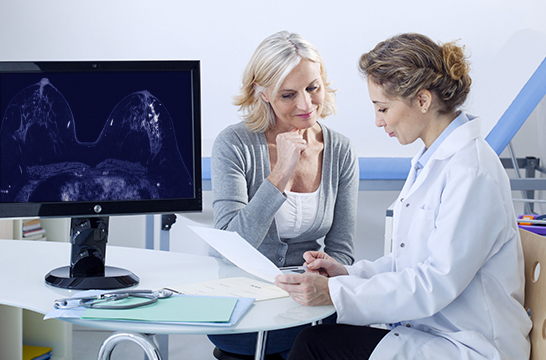Breast cancer is the most common type of cancer in the United States, affecting one of every eight women at some point in her lifetime. The National Breast Cancer Foundation states that the disease is so prevalent that it accounts for 27 percent of all new cancers diagnosed in any given year. Approximately 230,000 people learn they have breast cancer every year, 99 percent of whom are women. Although these statistics are sobering, the good news is that it’s highly treatable when detected early with a combination of a mammogram and an Accelerated Breast MRI screening. But what makes this advanced MRI screening a more proficient addition than even a 3D mammogram?
Benefits of an Accelerated Breast MRI Screening
When most women think of getting a mammogram, a 3D mammogram may first come to mind as this technology has advanced past the traditional 2D mammogram. And while a 3D mammogram can detect more cancer than a traditional digital mammography, the Accelerated Breast MRI is the latest advanced screening that all women need to pay attention to.
Our new Accelerated Breast MRI screening program provides the latest breakthrough technology in breast-care. This progressive radiation-free technology gives greater detail and accuracy compared to a digital or 3D mammogram alone while also providing more comfort. The Accelerated Breast MRI provides the same sensitivity and accuracy in detecting breast cancer as the full-protocol breast MRI in far less time and with lower costs. The Accelerated Breast MRI isn’t just for those that are considered a high-risk when it comes to breast cancer. This new technology is available for all women looking to better protect themselves and their future. Benefits of an Accelerated Breast MRI screening include:
- Faster scan times lasting 12 minutes or less
- Greater detail and accuracy than an ultrasound or mammogram alone
- Lower costs at thousands less than a full breast MRI
- Zero compression and zero radiation
The Accelerated Breast MRI is the perfect alternative for women with dense breast tissue through its improved ability to pick up abnormalities. The breast tissue of women consists of both dense and fatty tissue as well as milk ducts and glands. It can sometimes be difficult for doctors to spot a small tumor in women with greater breast density. Breast density can mask cancer detection in traditional and digital mammograms. Even 3D mammograms are unable to detect all forms of breast cancer when it comes to dense tissue. An Accelerated Breast MRI can not only detect all cancers found in other forms of mammograms, but it also has the power to detect 16-23 more cancers per 1000 women undiagnosed. To take advantage of this cutting-edge technology, it’s important that you pay close attention to the common risks for breast cancer and schedule an appointment with your doctor.
Common Risk Factors for Breast Cancer
According to the Centers for Disease Control (CDC), the two biggest risk factors for developing breast cancer are being female and over age 50. It also tends to run in families. If your mother, sister, or daughter has or had breast cancer, it increases the likelihood that you will develop it yourself. Some other common risks for developing breast cancer include:
- Inheriting a faulty BRAC1 or BRAC2 gene
- Premature menstruation or late menopause
- Obesity and/or a sedentary lifestyle
- High exposure to radiation therapy before age 30
- Heavy consumption of alcohol
- Previous history of breast cancer
- Taking hormone replacement medication for more than five years
- First pregnancy after age 30 or no successful pregnancies
Since you can’t control all risk factors of breast cancer, it’s essential to receive regular screenings. It’s also important to schedule a mammogram if you suspect that you have some common symptoms of breast cancer. These include:
- Swelling of one or both breasts
- Change in the size or appearance of one or both breasts, particularly if one appears dramatically smaller than the other
- A nipple has turned inward
- Skin around the breast appears red or scaly
- You feel a suspicious lump in one of your breasts
- Discharge from a nipple
If you recognize any of these symptoms or just feel that something isn’t right with your breast health, we urge you to contact your physician. He or she can write you a referral to obtain an Accelerated Breast MRI screening from American Health Imaging (AHI).
If you’re considering an Accelerated Breast MRI, we invite you to learn more about American Health Imaging by reviewing our frequently asked questions page. We look forward to receiving your doctor’s referral soon so we can help you stay healthy and protected for the future.
